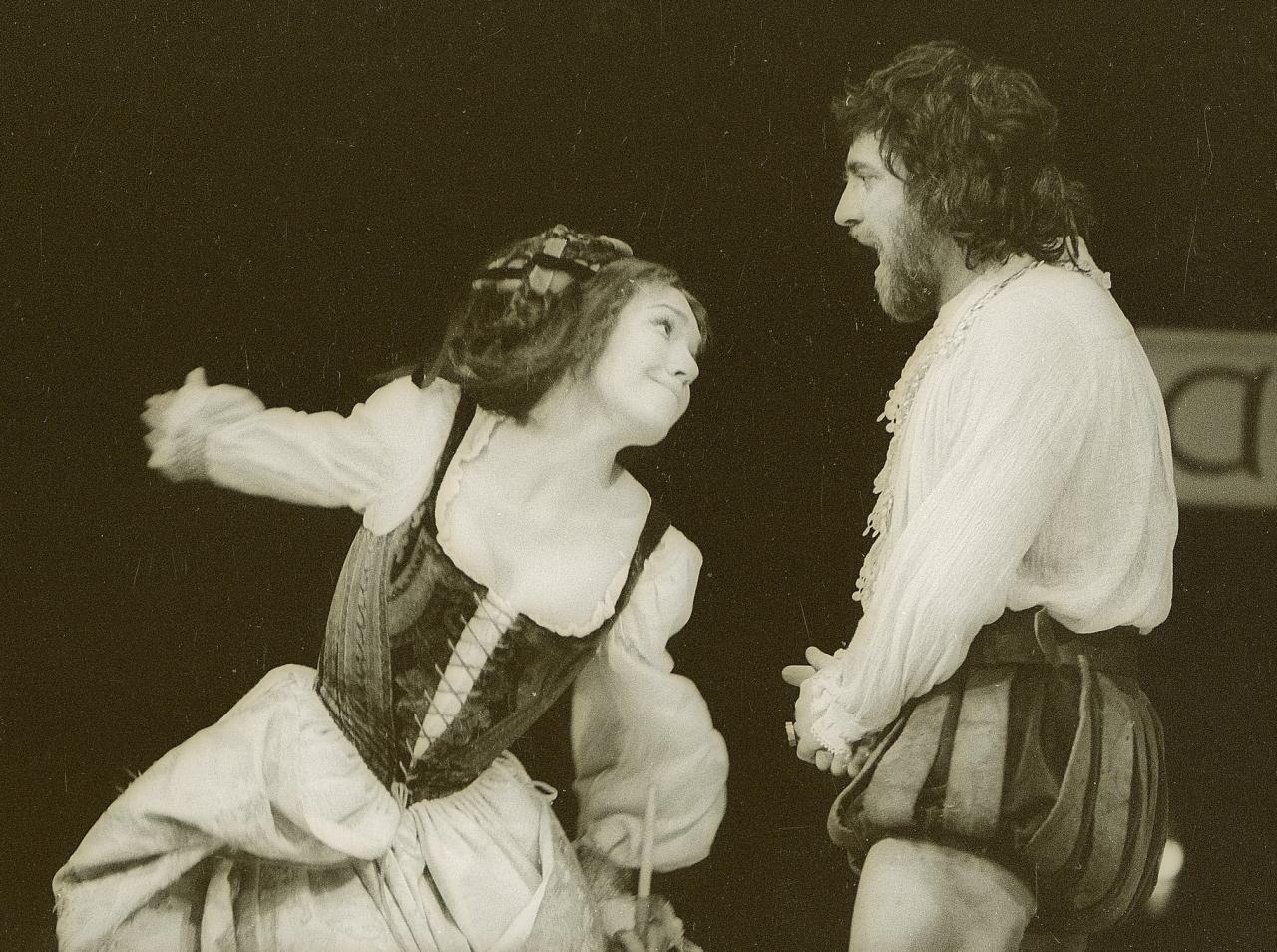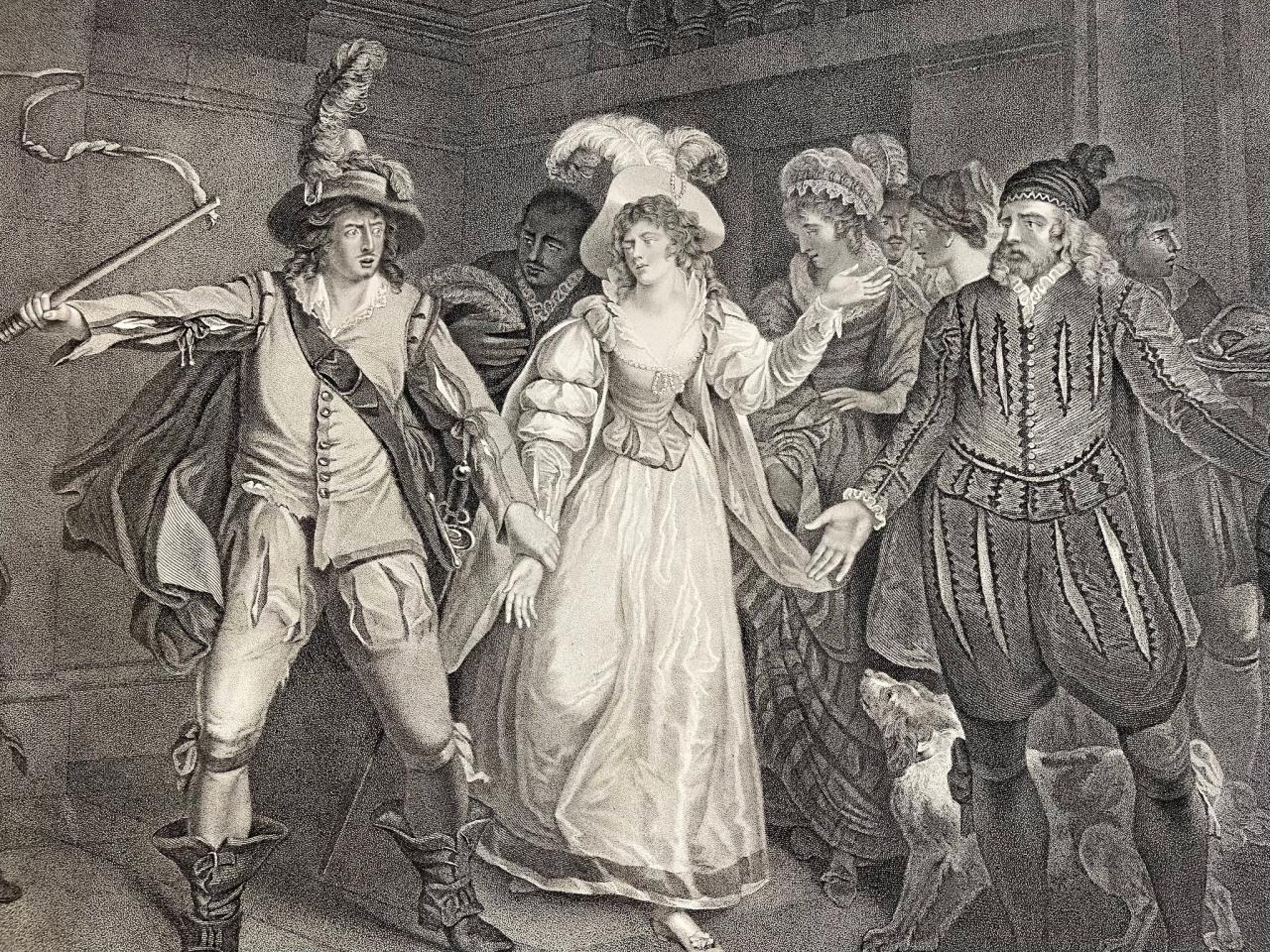Act 4 scene 5 taming of the shrew – In Act 4 Scene 5 of Shakespeare’s “The Taming of the Shrew,” a captivating narrative unfolds, where love, deception, and verbal duels intertwine in a whirlwind of emotions. As Bianca hatches a plan to deceive her fiery sister, Katharina, the stage is set for a battle of wits and disguises that will leave an indelible mark on the characters and the audience alike.
Lucentio’s clever disguise as a tutor adds an intriguing layer to the plot, while Hortensio’s jealousy fuels the dramatic tension. The transformation of Katharina, once a shrewish and untamed spirit, becomes a pivotal moment in the play, showcasing the power of love and determination.
Setting and Characters
Act 4, Scene 5 of “The Taming of the Shrew” takes place in a room in Petruchio’s country house. The characters present in this scene are:
- Petruchio, the newly married husband of Katherina
- Katherina, the strong-willed and independent wife of Petruchio
- Grumio, Petruchio’s servant
- Curtis, another of Petruchio’s servants
Petruchio and Katherina’s relationship is central to this scene. Petruchio is determined to tame his new wife, while Katherina is resistant to his authority. Grumio and Curtis provide comic relief and serve as Petruchio’s allies in his attempts to control Katherina.
Bianca’s Plan
In a bid to escape her confinement and pursue her love for Lucentio, Bianca devises an elaborate plan to deceive her ill-tempered sister, Katharina.
Bianca’s primary motivation stems from her desire for freedom and companionship. She believes that Katharina’s presence is an obstacle to her own happiness and that tricking her into a marriage will allow her to break free from her sister’s overbearing influence.
Consequences of Bianca’s Actions
- Potential damage to the relationship between Bianca and Katharina: Bianca’s deception could strain their bond and lead to resentment and mistrust.
- Ethical implications: Bianca’s plan involves lying and manipulating her sister, which raises questions about her moral character.
- Unforeseen consequences: The plan could backfire, resulting in unexpected outcomes that may harm Bianca or others.
Lucentio’s Disguise
Lucentio disguises himself as a tutor named Cambio to woo Bianca. He wears the traditional attire of a scholar, complete with a long gown, a cap, and a book in hand. To further enhance his disguise, he adopts a grave and pedantic manner, speaking in a learned and formal tone.
Lucentio’s disguise is effective in gaining access to Bianca’s household and winning her trust. However, it also poses challenges. Lucentio must maintain his disguise at all times, which can be difficult, especially when faced with unexpected situations. Additionally, he must be careful not to reveal his true identity, as this could jeopardize his plans.
Effectiveness of the Disguise
- Lucentio’s disguise allows him to gain access to Bianca’s household and win her trust.
- He is able to spend time with Bianca and teach her, which gives him the opportunity to woo her.
Challenges of the Disguise
- Lucentio must maintain his disguise at all times, which can be difficult, especially when faced with unexpected situations.
- He must be careful not to reveal his true identity, as this could jeopardize his plans.
Hortensio’s Jealousy
Hortensio’s jealousy of Lucentio’s pursuit of Bianca is a significant plot point in Act 4, Scene 5 of The Taming of the Shrew. Hortensio’s actions and motivations, driven by his intense desire for Bianca, create dramatic tension and drive the plot forward.
Hortensio’s jealousy manifests in several ways. He becomes increasingly hostile towards Lucentio, accusing him of being a rival for Bianca’s affections. He also attempts to sabotage Lucentio’s efforts to woo Bianca, such as by interrupting their conversations and spreading rumors about Lucentio’s character.
Impact on the Plot
Hortensio’s jealousy has a significant impact on the plot of the play. It creates conflict between Hortensio and Lucentio, adding tension to the romantic subplot. Additionally, Hortensio’s actions ultimately lead to his downfall, as he loses Bianca to Lucentio.
Katharina’s Transformation

Katharina’s transformation in Act 4, Scene 5 of “The Taming of the Shrew” is a pivotal moment in the play. Her drastic change in behavior and demeanor marks a significant turning point in the plot and the development of her character.
Reasons for Her Change
Several factors contribute to Katharina’s transformation. Firstly, Petruchio’s “taming” methods have had a profound effect on her. Through a combination of psychological manipulation, physical intimidation, and emotional deprivation, Petruchio has gradually broken down Katharina’s defenses and forced her to conform to his expectations.
Secondly, Katharina’s love for Petruchio plays a significant role. Despite their rocky start, Katharina has come to realize that Petruchio genuinely cares for her and that his harsh treatment is ultimately motivated by a desire to help her become a better person.
Significance of Her Transformation
Katharina’s transformation has several important implications for the play.
- It challenges the traditional gender roles of the time. By transforming Katharina from a shrewish and rebellious woman into a submissive and obedient wife, the play questions the idea that women are inherently inferior to men.
- It adds depth and complexity to Katharina’s character. Her transformation is not simply a matter of conforming to societal expectations; it is a journey of personal growth and self-discovery.
- It sets the stage for the play’s happy ending. Katharina’s transformation ultimately leads to a reconciliation between her and Petruchio, paving the way for a future of love and happiness.
Verbal Duel between Petruchio and Katharina
The verbal duel between Petruchio and Katharina is one of the most iconic scenes in The Taming of the Shrew. The two characters engage in a battle of wits, using wordplay and insults to try to outdo each other.
Petruchio is a wealthy suitor who has come to Padua to find a wife. He is known for his blunt and outspoken manner, and he is not afraid to speak his mind. Katharina is a strong-willed and independent woman who is not interested in marriage.
She is quick-witted and sharp-tongued, and she is more than capable of holding her own against Petruchio.
The verbal duel between Petruchio and Katharina begins when Petruchio arrives at Katharina’s father’s house. Petruchio immediately begins to insult Katharina, calling her a “curst shrew” and a “fiend of hell.” Katharina responds in kind, calling Petruchio a “fool” and a “coward.”
The two characters continue to trade insults, each trying to outdo the other.
The verbal duel between Petruchio and Katharina is a display of wit and wordplay. The two characters use puns, double entendres, and other figures of speech to try to outsmart each other. The duel is also a display of power dynamics.
Petruchio is trying to assert his dominance over Katharina, while Katharina is trying to maintain her independence.
Power Dynamics
The verbal duel between Petruchio and Katharina is a reflection of the power dynamics between men and women in Elizabethan society. At the time, women were considered to be inferior to men, and they were expected to be obedient and subservient.
Petruchio’s attempts to dominate Katharina are a reflection of this societal norm.
However, Katharina is not a typical Elizabethan woman. She is strong-willed and independent, and she is not afraid to stand up for herself. Her refusal to submit to Petruchio’s authority is a challenge to the traditional power dynamics between men and women.
The verbal duel between Petruchio and Katharina is a complex and nuanced scene. It is a display of wit and wordplay, but it is also a reflection of the power dynamics between men and women in Elizabethan society.
Baptista’s Role

Baptista Minola, the wealthy merchant of Padua, plays a crucial role in Act 4, Scene 5 of “The Taming of the Shrew.” As the father of both Bianca and Katharina, he is deeply invested in his daughters’ futures and has a strong influence on the events that unfold.Baptista’s
primary motivation is to ensure the happiness and well-being of his daughters. He is aware of Katharina’s difficult nature and is eager to find a suitable husband for her. He is also keen to see Bianca happily married, but he is more cautious in his approach, as she is considered the more desirable of the two sisters.Throughout
the scene, Baptista acts as a mediator between the various characters. He attempts to pacify Petruchio when he arrives to claim Katharina as his wife, and he tries to persuade Katharina to accept her fate. He also intervenes when Hortensio becomes jealous of Petruchio’s success in taming Katharina.Baptista’s
actions have a significant impact on the plot. His decision to allow Petruchio to marry Katharina sets the stage for the play’s central conflict. His willingness to listen to Petruchio’s explanations helps to resolve the conflict between the newlyweds. And his intervention in the dispute between Hortensio and Petruchio prevents further bloodshed.Overall,
Baptista Minola is a complex and pivotal character in Act 4, Scene 5 of “The Taming of the Shrew.” His motivations and actions drive the plot forward and contribute to the play’s overall themes and conflicts.
Themes and Motifs
Act 4, Scene 5 of “The Taming of the Shrew” is a pivotal scene that explores several key themes and motifs present throughout the play.
Marriage and Domestic Power Dynamics
- The scene highlights the power struggle between Petruchio and Katharina as they negotiate their roles within their marriage.
- Petruchio’s methods of “taming” Katharina, including sleep deprivation and food denial, reflect the patriarchal norms of the Elizabethan era.
Social Conformity vs. Individuality
- Katharina’s transformation from a rebellious shrew to a submissive wife raises questions about the expectations placed on women in society.
- The scene explores the tension between conforming to social norms and maintaining one’s individuality.
Verbal Duel and Wit, Act 4 scene 5 taming of the shrew
- The verbal duel between Petruchio and Katharina is a display of wit and linguistic mastery.
- The characters use language as a weapon to assert their dominance and establish their positions within the relationship.
Control and Manipulation
- Petruchio’s treatment of Katharina is characterized by manipulation and control.
- He uses various tactics to break her spirit and force her into submission.
Question Bank: Act 4 Scene 5 Taming Of The Shrew
What is the significance of Bianca’s plan?
Bianca’s plan to deceive Katharina is driven by her desire to secure a wealthy husband for herself. By convincing Katharina to marry Petruchio, she hopes to remove her as a rival for her own suitors.
How does Lucentio’s disguise help him woo Bianca?
Lucentio’s disguise as a tutor allows him to spend time with Bianca without arousing suspicion from her father, Baptista. It also gives him the opportunity to demonstrate his intelligence and wit, which eventually wins Bianca’s affection.
What is the reason for Hortensio’s jealousy?
Hortensio is jealous of Lucentio because he believes that Lucentio is a more suitable match for Bianca than he is. His jealousy leads him to attempt to sabotage Lucentio’s plans.
How does Katharina’s transformation impact the plot?
Katharina’s transformation from a shrewish and untamed spirit to a loving and obedient wife is a pivotal moment in the play. It demonstrates the power of love and determination, and it sets the stage for a happy ending for both Katharina and Petruchio.
What is the significance of the verbal duel between Petruchio and Katharina?
The verbal duel between Petruchio and Katharina is a battle of wits and wills. It showcases the intelligence and wit of both characters, and it establishes the power dynamics between them.